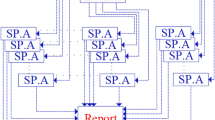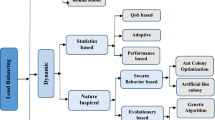Abstract
The effectiveness of loop self-scheduling schemes has been shown on traditional multiprocessors in the past and computing clusters in the recent years. However, parallel loop scheduling has not been widely applied to computing grids, which are characterized by heterogeneous resources and dynamic environments. In this paper, a performance-based approach, taking the two characteristics above into consideration, is proposed to schedule parallel loop iterations on grid environments. Furthermore, we use a parameter, SWR, to estimate the proportion of the workload which can be scheduled statically, thus alleviating the effect of irregular workloads. Experimental results on a grid testbed show that the proposed approach can reduce the completion time for applications with regular or irregular workloads. Consequently, we claim that parallel loop scheduling can benefit applications on grid environments.
Similar content being viewed by others
References
Baker MA, Fox GC (1999) Metacomputing: harnessing informal supercomputers. In: High performance cluster computing. Prentice-Hall
Banicescu I, Carino RL, Pabico JP, Balasubramaniam M (2005) Overhead analysis of a dynamic load balancing library for cluster computing. In: Proceedings of the 19th IEEE international parallel and distributed processing symposium, 2005
Cheng KW, Yang CT, Lai CL, Chang SC (2004) A parallel loop self-scheduling on grid computing environments. In: Proceedings of the 2004 IEEE international symposium on parallel architectures, algorithms and networks, KH, China, May 2004, pp 409–414
Chronopoulos AT, Penmatsa S, Xu J, Ali S (2006) Distributed loop-self-scheduling schemes for heterogeneous computer systems. Concurr Comput: Pract Exp 18:771–785
Chronopoulos AT, Andonie R, Benche M, Grosu D (2001) A class of loop self-scheduling for heterogeneous clusters. In: Proceedings of the 2001 IEEE international conference on cluster computing, 2001, pp 282–291
Foster I, Kesselman C (1997) Globus: a metacomputing infrastructure toolkit. Int J Supercomput Appl High Perform Comput 11(2):115–128
Foster I, Kesselman C, Tuecke S (2001) The anatomy of the grid: enabling scalable virtual organizations. Int J Supercomput Appl High Perform Comput 15(3):200–222
Foster I (2002) The Grid: a new infrastructure for 21st century science. Phys Today 55(2):42–47
The Globus Project. http://www.globus.org/
Herrera J, Huedo E, Montero RS, Llorente IM (2006) Loosely-coupled loop scheduling in computational grids. In: Proceedings of the 20th IEEE international parallel and distributed processing symposium, 2006
Hummel SF, Schonberg E, Flynn LE (1992) Factoring: a method scheme for scheduling parallel loops. Commun ACM 35:90–101
Kruskal C, Weiss A (1984) Allocating independent subtaskson parallel processors. IEEE Trans Softw Eng 11:1001–1016
Mandelbrot BB (1988) Fractal geometry of nature. Freeman, New York
MPICH-G2. http://www.hpclab.niu.edu/mpi/
Polychronopoulos CD, Kuck D (1987) Guided self-scheduling: a practical scheduling scheme for parallel supercomputers. IEEE Trans Comput 36(12):1425–1439
Shih WC, Yang CT, Tseng SS (2005) A hybrid parallel loop scheduling scheme on grid environments. In: Grid and cooperative computing—GCC 2005: fourth international conference, Lecture notes in computer science. Springer, November 2005
Shih WC, Yang CT, Tseng SS (2005) A performance-based parallel loop self-scheduling on grid environments. In: Network and parallel computing: IFIP international conference, NPC 2005, Lecture notes in computer science, vol 3779. Springer, November 2005, pp 48–55
Smarr L, Catlett C (1992) Metacomputing. Commun ACM 35(6):44–52
Tabirca S, Tabirca T, Yang LT (2006) A convergence study of the discrete FGDLS algorithm. IEICE Trans Inf Syst E89-D(2):673–678
Tang P, Yew PC (1986) Processor self-scheduling for multiple-nested parallel loops. In: Proceedings of the 1986 international conference on parallel processing, 1986, pp 528–535
TIGER Grid Report. http://gamma2.hpc.csie.thu.edu.tw/ganglia/
Tzen TH, Ni LM (1993) Trapezoid self-scheduling: a practical scheduling scheme for parallel compilers. IEEE Trans Parallel Distrib Syst 4:87–98
Yang CT, Chang SC (2004) A parallel loop self-scheduling on extremely heterogeneous PC clusters. J Inf Sci Eng 20(2):263–273
Yang CT, Cheng KW, Li KC (2004) An efficient parallel loop self-scheduling on grid environments. In: Jin H, Gao G, Xu Z (eds), NPC’2004 IFIP international conference on network and parallel computing, Lecture notes in computer science. Springer, Heidelberg
Yang CT, Cheng KW, Li KC (2005) An efficient parallel loop self-scheduling scheme for cluster environments. J Supercomput 34:315–335
Author information
Authors and Affiliations
Corresponding author
Rights and permissions
About this article
Cite this article
Shih, WC., Yang, CT. & Tseng, SS. A performance-based parallel loop scheduling on grid environments. J Supercomput 41, 247–267 (2007). https://doi.org/10.1007/s11227-007-0115-7
Received:
Accepted:
Published:
Issue Date:
DOI: https://doi.org/10.1007/s11227-007-0115-7




